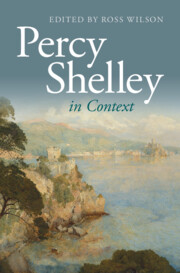Book contents
- Percy Shelley in Context
- Percy Shelley in Context
- Copyright page
- Contents
- Figures
- Contributors
- Preface
- Acknowledgements
- Abbreviations
- Part I Life and Death
- Part II Intellectual, Cultural, and Political Contexts
- Chapter 7 Ancient Philosophy
- Chapter 8 Ancient Poetry
- Chapter 9 English Literature to 1792
- Chapter 10 European Literature, Dante to Rousseau
- Chapter 11 The Visual and Plastic Arts
- Chapter 12 The Radical Press
- Chapter 13 Shelley and the Lake Poets
- Chapter 14 Mary Shelley
- Chapter 15 Thomas Love Peacock
- Chapter 16 Byron and Shelley
- Chapter 17 Keats and Shelley
- Chapter 18 Revolution and Reform
- Chapter 19 Political Economy
- Chapter 20 Empire
- Chapter 21 Shelley’s Sexless Sexuality
- Chapter 22 The British Empiricists
- Chapter 23 The Sciences
- Chapter 24 Religion
- Part III Writings
- Part IV Afterlives
- Further Reading
- Index
Chapter 20 - Empire
from Part II - Intellectual, Cultural, and Political Contexts
Published online by Cambridge University Press: 17 April 2025
- Percy Shelley in Context
- Percy Shelley in Context
- Copyright page
- Contents
- Figures
- Contributors
- Preface
- Acknowledgements
- Abbreviations
- Part I Life and Death
- Part II Intellectual, Cultural, and Political Contexts
- Chapter 7 Ancient Philosophy
- Chapter 8 Ancient Poetry
- Chapter 9 English Literature to 1792
- Chapter 10 European Literature, Dante to Rousseau
- Chapter 11 The Visual and Plastic Arts
- Chapter 12 The Radical Press
- Chapter 13 Shelley and the Lake Poets
- Chapter 14 Mary Shelley
- Chapter 15 Thomas Love Peacock
- Chapter 16 Byron and Shelley
- Chapter 17 Keats and Shelley
- Chapter 18 Revolution and Reform
- Chapter 19 Political Economy
- Chapter 20 Empire
- Chapter 21 Shelley’s Sexless Sexuality
- Chapter 22 The British Empiricists
- Chapter 23 The Sciences
- Chapter 24 Religion
- Part III Writings
- Part IV Afterlives
- Further Reading
- Index
Summary
This chapter explores Percy Shelley’s lifelong engagement with ‘empire’ by focusing on some of his major poems. His fascination with the ruins of empires, both ancient and modern, leads to a thorough critical examination of imperial violence. In Prometheus Unbound, Shelley redefines ‘empire’ as self-government that limits imperial dominance, which has far-reaching and international repercussions, as seen in the Gandhians’ resistance against British rule. Shelley goes on to examine the nature of empire in his final unfinished poem, ‘The Triumph of Life’, in which a triumphal chariot, the relentless force of empire originating from ‘Imperial Rome’, continues the cycle of subjugation throughout history. Against this chariot, Shelley places a resisting poet/narrator, who is asked, along with the readers of contemporary and future generations, to undertake the difficult task of envisioning a future unbound by imperial chains after the collapse of ‘empire’.
Keywords
- Type
- Chapter
- Information
- Percy Shelley in Context , pp. 150 - 157Publisher: Cambridge University PressPrint publication year: 2025

